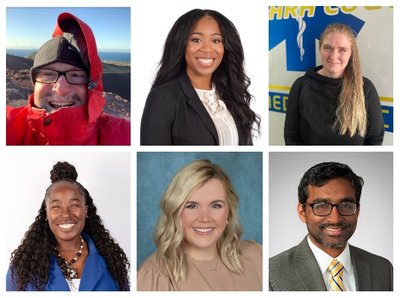Meet the 2022 EMSC Scholars
- Published October 2, 2022

The EMSC Innovation and Improvement Center has announced six new scholars from across disciplines and across the country as part of the second cohort of the EMSC Scholars Program. The EMSC Scholars Program is designed to engage and support early and late career clinicians and health systems professionals to become future leaders in the EMSC space. During the one- to two-year program, scholars work alongside experts in the field to develop and implement a research project in an area of interest.
The selection committee said it was overwhelmed by the quality and quantity of applications received during the second cycle of the program.
The EMSC Fellows and Pediatric Pandemic Network Scholars will be announced next month.
Welcome the 2022 EMSC Scholars!

Chidimma Acholonu, MD, MPH, from Comer Children’s Hospital, University of Chicago Medical Center
“My experience as a resident at University of Chicago has provided a unique perspective for areas of opportunity to improve care provided for kids in the emergency department. Combined with my public health background, I have always been interested in systems-level interventions and felt this program could provide an opportunity to help me learn how to engage in those efforts specifically in the PEM landscape. I hope to grow my network in the PEM space and identify innovative skills and strategies for improving health outcomes for kids. As I start my career as a PEM physician, I am also hoping for mentorship and guidance on how to integrate clinical and non-clinical interests into my career moving forward.”

Chris Caulkins, EdD, MPH, MA, NRP, CP, CEM-MN, from Allina Health EMS and a professor at Maharashtra Institute of Technology
“The U.S. healthcare system is broken when it comes to mental health and needs serious help. We have more deaths due to suicide than we do in traffic accidents, fires, severe weather, and homicides, yet comparatively few resources are devoted to addressing this serious public health problem. I'd like to use research as a mechanism to leave the world a little better place than I found it.”

Cyntoria Meaderds, PhD candidate, MA, from the CDC Foundation and Tennessee Department of Health
“I believe that to provide quality services, QI is important. Also, the impact of the pandemic and the current news of polio and monkeypox led me to my interest in learning more about disaster preparedness in pediatric settings. Finally, coordination of care is vital to patient experience and inadvertently patient health outcomes. Learning more about the administration and coordination of care for children in the emergency department and research would assist in my future goal of opening a behavioral health clinic for children and women in the military. I hope that through the guidance and mentoring of this program, I am able to assist with improving the quality of pediatric health, address pediatric disparities through research, and/or increase the overall preparedness of health facilities that provide health services to children.”

Jessica Lease, CCP, from Waushara County EMS
“As a healthcare provider in a rural setting, meeting the needs of our littlest of patient's can bring numerous challenges but these mustn't limit our ability to provide cutting-edge care. I seek to break down some of the barriers we face in rural medicine through creative and out of the box thinking. I would like to see integration and focus on prehospital pediatric treatments as we implement state of the art telehealth capabilities within our EMS system.”

Sriram Ramgopal, MD, from Ann & Robert H. Lurie Children’s Hospital and an assistant professor of Pediatrics at Northwestern University Feinberg School of Medicine
“I am interested in data science and prediction modeling, including modeling and validation of vital signs in pediatrics and their incorporation into alerts and prediction models to identify at-risk children. I am also interested in disparities in the use of EMS based on social determinants of health. Modeling of vital signs with respect to age, their validation and determination of their association with in-hospital outcomes; characterization of social determinants of health in prehospital care.”

Megan Zelonis, BSN, RN, from Geisinger Health System
“Within my role, I am privileged to work with nine emergency departments within our rural health system encouraging and coordinating quality improvement initiatives and pediatric readiness. Through local mentorship in our Improving Pediatric Sepsis Outcomes work, I have learned the basics of quality improvement science. I am eager to learn more through the EMSC Scholars program with intent to better lead quality initiatives for pediatric patients. Participating in the EMSC Scholars program will provide me with greater opportunity to develop professionally and share knowledge gained from experts in pediatric emergency care. More importantly, the knowledge and networking that can be acquired in a program such as this offers the opportunity to magnify the importance of quality emergency care for children.”
In the coming months, the scholars will refine their project topics and identify mentors.
2021 EMSC Scholars continue to wrap up work
The 2021 EMSC Scholars continue to wrap up their projects in collaboration with EMSC mentors. Several have completed their work and created poster presentations for national conferences and are writing up their work for publication. Others are continuing their projects and intend to submit presentations and publications upon completion.
- A Career of Connection and Impact: Reflecting on Longstanding Service in EMSC February 24, 2026
- Results of First Comprehensive Assessment of Pediatric Capabilities of EMS and Fire-Rescue Agencies Published February 17, 2026
- New National Statement Sets Life-Saving Standards for Pediatric Readiness in Emergency Departments January 20, 2026
Sign up for news and updates straight to your inbox.